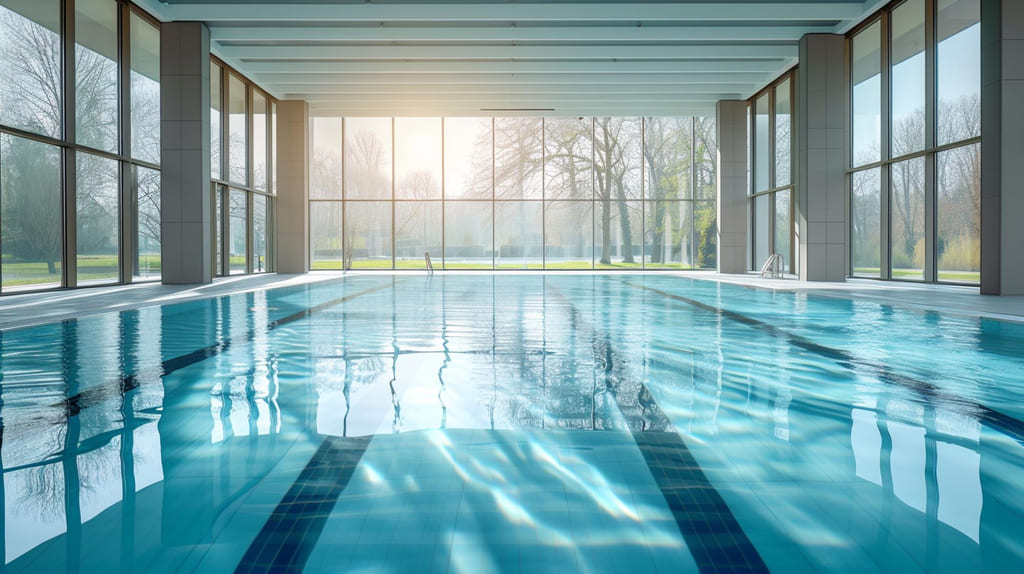Enjoying a swimming pool at any time of the year, even during the coldest months, is possible if you have an adequate heating system. If you’ve wondered how to heat a pool, you should know that there are various solutions available that allow you to maintain the water temperature at a comfortable level.
However, each method has its pros and cons, depending on factors such as the type of pool, the climate, and the available budget. Below, from our construction company in Málaga, we will analyze the best options so you can choose the one that best suits your needs.
Benefits of heating a pool
Heating a pool offers multiple advantages beyond simply extending the swimming season. Among the main benefits are:
- Greater comfort: Enjoying water at a pleasant temperature, regardless of the season.
- Increased usage: You will no longer be limited to the summer months.
- Added value: A heated pool increases the property’s value.
- Health benefits: Warm water is ideal for practicing water sports or therapies.
How to heat a pool?
Heat Pump
Heat pumps are one of the most commonly used solutions for heating a pool. They work by extracting heat from the outside air and transferring it to the water, making them an energy-efficient option. These units are perfect for temperate climates, as they can continue to operate even when the air is cool. Their main features include:
- Low energy consumption: They are efficient in terms of electricity use.
- Constant operation: They can maintain the water temperature year-round.
- Simple installation: They do not require complex construction work.
However, their performance may decrease in very cold climates, where the air is not warm enough to extract energy efficiently.
Solar Heating Systems: An Eco-friendly Option
If you’re looking for a sustainable way to heat a pool, solar heating systems are an excellent alternative. They harness the sun’s energy to heat the water through solar panels, making them an eco-friendly option with low operational costs. Their advantages include:
- Renewable energy: By using the sun, they generate no electric costs or harmful emissions.
- Low maintenance: Once installed, they require little attention.
- High initial cost: While the initial investment can be significant, the long-term savings are substantial.
The main drawback is that their effectiveness depends on the number of sunlight hours, so in areas with cloudy winters or short daylight hours, they may not be sufficient to keep the water at a comfortable temperature.
Pool Heaters: Efficiency and Power
Another option for those wondering how to heat a pool is to use a heater, either gas or electric. This system is fast and effective for heating large volumes of water in a short time. It’s especially useful for indoor pools or for those looking to heat the water in very cold climates. Some features include:
- Speed: Heaters can raise the water temperature quickly.
- Efficiency in cold climates: They work well even in extreme conditions.
- Operating costs: Constant use of gas or electricity can be expensive in the long run.
Despite their effectiveness, they are a less eco-friendly option as they produce more CO₂ emissions compared to heat pumps or solar systems.
Thermal Covers: The perfect complement
Thermal covers are a complementary solution to improve the efficiency of any heating system. They help retain heat in the water during the night or on cold days, reducing the amount of energy needed to keep the pool warm. Their benefits include:
- Energy savings: By preventing heat loss, they reduce the use of heat pumps or heaters.
- Water protection: They also keep the pool clean by preventing leaves and debris from entering.
- Easy installation: They are an economical and simple solution to implement.
Although they do not heat the pool on their own, they are essential to maximize the efficiency of any system.
So, what is the best way to heat a swimming pool?
- If you’re looking for energy efficiency: Heat pumps or solar panels are the best options. Solar panels are highly recommended in areas with plenty of sunshine, while heat pumps are versatile in most climates.
- If the climate is cold or you only need occasional heating: Gas or electric heaters can be more practical, although they are more expensive to operate.
- If you want to save money and just maintain the temperature: Thermal covers are an economical and effective solution to complement any other heating system.
Final considerations when heating a pool
The choice of the right system for heating a pool will depend on various factors such as climate, pool size, and available budget. Heat pumps are a popular option for their balance between cost and efficiency, while solar systems provide an eco-friendly solution but are dependent on weather conditions. Boilers are the most powerful option, ideal for cold climates or indoor pools.
It’s also important to consider installing thermal covers, which help optimize the performance of the chosen heating system and reduce energy costs.
If you are interested in any type of home reforms, LEBA is the right construction company for you and your project.
Remember that you can continue visiting our blog; we think you might be interested in our post: “5 differences between renovation and rehabilitation.”


